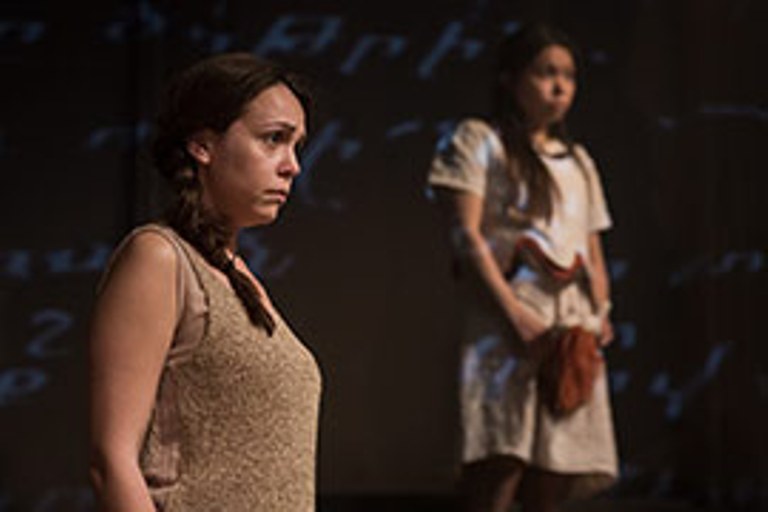Agitprop is a term that seems to have dropped out of use. It has too many negative connotations; it smacks of political rant. Yet artistic director Neil McPherson, whose small and feisty Finborough Theatre at Earls Court receives no public funding whatsoever, has never pandered to delicate West London sensibilities, and I Wish to Die Singing: Voices from the Armenian Genocide, scripted by him, certainly doesn’t flinch from its task. This is, no less, to fill a gaping hole in the official history of the 20th century. Propaganda? You decide.
McPherson’s bold project sprang from a perceived need to right a global wrong. Our more thoughtful news media may have run items on the Armenian Genocide in the run-up to its centenary on Friday 24 April but, shockingly, the UK Government, along with the US administration and the State of Israel, as well as the Turkish government, still refuse to concede that the deaths in 1915 of one and half million Armenian men, women and children at the hands of the Ottoman Empire amounted to planned mass murder. I Wish to Die Singing sets out to say why it unarguably was so, and why we should demand that our own government, at least, should use the G-word – not just for the sake of truth and integrity, but to show that we are not completely cowed by the Islamic worldview. (It remains a punishable offence to voice the words “Armenian Genocide” in Turkey today.)
It’s important to state from the outset that this is not a play. But perhaps it was wise of McPherson not to let on in advance that it was to be an illustrated lecture. Actor Jilly Bond, brisk in a trouser suit, is our lecturer (she even uses slide projections) and her opening spiel is pitched to engage any dozing students at the back. You think you don’t know any Armenians? Up on the screen flash smiling images of Kim Kardashian, Cher, Alain Prost and other global celebs. Even Princess Di was one 64th Armenian, we learn.
 But the facts from thereon in are a lot less fun. Three characters in turn introduce themselves. “My name is Fethiye/Anahit/whatever … I’m six/11/16 years old and I live with my family in a village …” Through these opening monologues we build up a picture of a Christian minority living peaceably enough alongside the Muslim Turks. Yet soon enough comparisons with the Jewish experience in Europe are inevitable. An entire stratum of Ottoman professional life – medicine, law, academia, classical music – was dominated by Armenian talent, and increasingly resented.
But the facts from thereon in are a lot less fun. Three characters in turn introduce themselves. “My name is Fethiye/Anahit/whatever … I’m six/11/16 years old and I live with my family in a village …” Through these opening monologues we build up a picture of a Christian minority living peaceably enough alongside the Muslim Turks. Yet soon enough comparisons with the Jewish experience in Europe are inevitable. An entire stratum of Ottoman professional life – medicine, law, academia, classical music – was dominated by Armenian talent, and increasingly resented.
What then happened to the Armenians began to follow a now horribly familiar pattern, beginning with their land and property being seized by the state, continuing with the dismantling of 3,500 years of culture, and culminating with the massacre of entire populations of villages and towns. Those Armenians remaining were forced by the Turkish militia to march without food or water, or shoes, into the desert. It’s to the writer’s (and director Tommo Fowler’s) credit that we submit to listen to these horrors, and worse: the text metes them out via the mouths of the two little girls (Tamar Karabetyan, pictured above with Kate Binchy, and below with Siu-see Hung) and a teenage boy (all played by adults). The childish voices grate somewhat, but as a script device, it works. Children are able to describe atrocities unencumbered by the rage and despair an adult would bring to the telling. It’s also true that the few survivors of the genocide were mostly very young. As an old man (excellent Tom Marshall) recalls bitterly and with typical guilt: “You cannot be a true witness if you survived”.
 The monologues alternate between the children and two rheumy-eyed elders, reaching into 80- or even 90-year-old memories. The lecturer also chips in to push the story forward. We are thankfully spared too many projected images of starved and naked bodies. The anecdotes suffice: the women who hid their last remaining trinkets in their sanitary towels – it was the only place the Muslim soldiers wouldn’t look; or the grandmother who, arriving at a river after months of forced marching, drowned her two small grandchildren to relieve their suffering. There is a hateful exchange between a sneering local commander and an American visitor who dares to challenge him. He prefers the word “cleansing” to “killing”. On the whole, though, there is little dialogue. The characters talk at the audience, not to one another, which gives the whole evening a stiltedness that is perhaps appropriate. How do you dramatise the dismantling of a nation’s body and spirit?
The monologues alternate between the children and two rheumy-eyed elders, reaching into 80- or even 90-year-old memories. The lecturer also chips in to push the story forward. We are thankfully spared too many projected images of starved and naked bodies. The anecdotes suffice: the women who hid their last remaining trinkets in their sanitary towels – it was the only place the Muslim soldiers wouldn’t look; or the grandmother who, arriving at a river after months of forced marching, drowned her two small grandchildren to relieve their suffering. There is a hateful exchange between a sneering local commander and an American visitor who dares to challenge him. He prefers the word “cleansing” to “killing”. On the whole, though, there is little dialogue. The characters talk at the audience, not to one another, which gives the whole evening a stiltedness that is perhaps appropriate. How do you dramatise the dismantling of a nation’s body and spirit?
In place of the usual programme notes (in a sense, the entire evening is one giant programme note), the Finborough reproduces a briefing paper originally presented at the US State Department in 1996. It identifies “the eight stages of genocide”. These include “dehumanisation” - in light of these stories we know what that entails – and the final stage is “denial”. If this strange, stark lecture cum verbatim-theatre hybrid achieves nothing else, it will have added a few hundred more signatures to the petition at change.org.
- I Wish to Die Singing: Voices from the Armenian Genocide at the Finborough Theatre until 16 May















Add comment